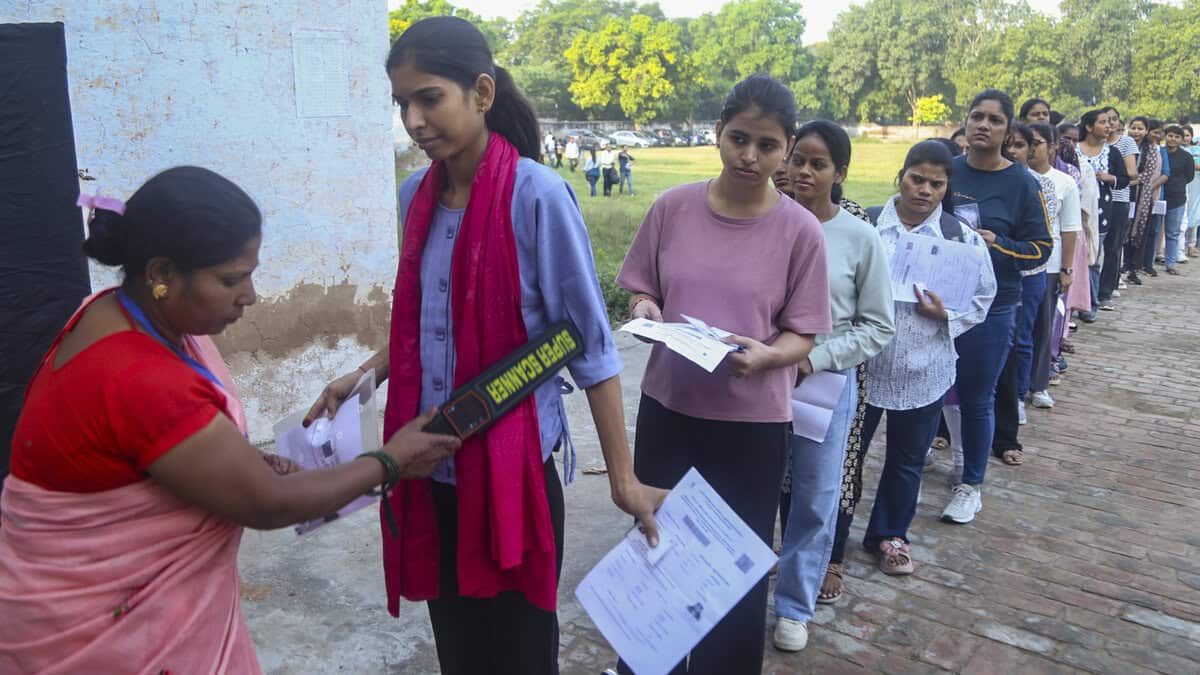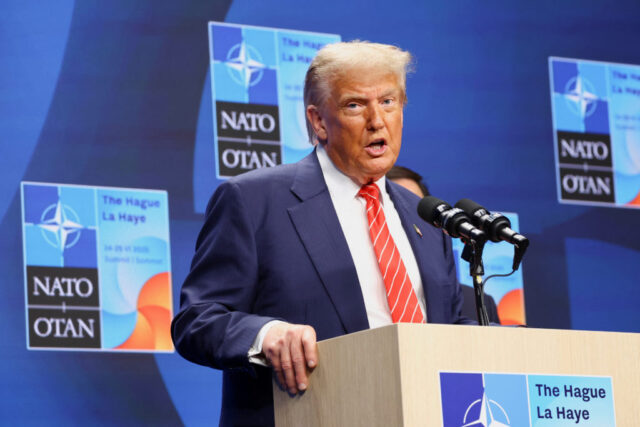THE HAGUE, Netherlands (AP) — The fragile ceasefire between Israel and Iran appeared to be holding on Wednesday while U.S. President Donald Trump asserted that U.S. and Iranian officials will talk next week, giving rise to cautious hope for longer-term peace even as Tehran insisted it will not give up its nuclear program.
Trump, who helped negotiate the ceasefire that took hold Tuesday on the 12th day of the war, told reporters at a NATO summit that he wasn’t particularly interested in restarting negotiations with Iran, insisting that U.S. strikes had destroyed its nuclear program. Earlier in the day, an Iranian official questioned whether the United States could be trusted after its weekend attack.
READ MORE: Trump, NATO to gather for summit amid rising global tensions
“We may sign an agreement, I don’t know,” Trump said. “The way I look at it, they fought, the war is done.”
Iran has not acknowledged any talks taking place next week, though U.S. Mideast envoy Steve Witkoff has said there has been direct and indirect communication between the countries. A sixth round of negotiations between the U.S. and Iran had been scheduled for earlier this month in Oman but was cancelled when Israel attacked Iran.
Earlier, Trump said the ceasefire was going “very well,” and added that Iran was “not going to have a bomb and they’re not going to enrich.”
Iran has insisted, however, that it will not give up its nuclear program. In a vote underscoring the tough path ahead, its parliament agreed to fast-track a proposal that would effectively stop the country’s cooperation with the International Atomic Energy Agency, the U.N. watchdog that has monitored the program for years.
Ahead of the vote, Parliament Speaker Mohammad Bagher Qalibaf criticized the IAEA for having “refused to even pretend to condemn the attack on Iran’s nuclear facilities” that the U.S. carried out on Sunday.
“For this reason, the Atomic Energy Organization of Iran will suspend cooperation with the IAEA until security of nuclear facilities is ensured, and Iran’s peaceful nuclear program will move forward at a faster pace,” Qalibaf told lawmakers.
WATCH MORE: How Iran’s response to U.S. strikes signaled a desire to de-escalate
IAEA Director General Rafael Mariano Grossi said he had written to Iran to discuss resuming inspections of their nuclear facilities. Among other things, Iran claims to have moved its highly enriched uranium ahead of the U.S. strikes, and Grossi said his inspectors need to re-assess the country’s stockpiles.
“We need to return,” he said. “We need to engage.”
French President Emmanuel Macron, whose country was part of the 2015 deal with Iran that restricted its nuclear program but began unraveling after Trump pulled the U.S. out in his first term, said he hoped Tehran would come back to the table.
Iran has long maintained that its nuclear program was peaceful, and U.S. intelligence agencies have assessed that Tehran is not actively pursuing a bomb. However, Israeli leaders have argued that Iran could quickly assemble a nuclear weapon.
Israel is widely believed to be the only Middle Eastern country with nuclear weapons, which it has never acknowledged.
Questions over effectiveness of the US strikes
The Israel Atomic Energy Commission said its assessment was that the U.S. and Israeli strikes have “set back Iran’s ability to develop nuclear weapons by many years.” It did not give evidence to back up its claim.
The U.S. strikes hit three Iranian nuclear sites, which Trump said “completely and fully obliterated” the country’s nuclear program. When asked about a U.S. intelligence report that found Iran’s nuclear program has been set back only a few months, Trump scoffed and said it would at least take “years” to rebuild.
READ MORE: New U.S. intelligence report suggests Iran’s nuclear program only set back by months after strikes
Iran’s Foreign Ministry spokesman, Esmail Baghaei, confirmed that the strikes by U.S. B-2 bombers using bunker-buster bombs had caused significant damage.
“Our nuclear installations have been badly damaged, that’s for sure,” he told Al Jazeera on Wednesday, while refusing to go into detail.
He seemed to suggest Iran might not shut out IAEA inspectors for good, noting that the bill before parliament only talks of suspending work with the agency, not ending it. He also insisted Iran has the right to pursue a nuclear energy program.
“Iran is determined to preserve that right under any circumstances,” he said.
Witkoff said on Fox News late on Tuesday that Israel and the U.S. had achieved their objective of “the total destruction of the enrichment capacity” in Iran, and Iran’s prerequisite for talks — that Israel end its campaign — had been fulfilled.
“The proof is in the pudding,” he said. “No one’s shooting at each other. It’s over.”
Grossi said he could not speculate on how bad the damage was but that Iran’s nuclear capabilities were well known.
“The technical knowledge is there, and the industrial capacity is there,” he said. “That no one can deny, so we need to work together with them.”
Hopes for a long-term peace agreement
An Israeli official, speaking on condition of anonymity to discuss internal deliberations, said the ceasefire agreement with Iran amounted to “quiet for quiet,” with no further understandings about Iran’s nuclear program going ahead.
READ MORE: A fragile ceasefire between Iran and Israel gives hope for long-term peace
Witkoff told Fox News that Trump is now looking to land “a comprehensive peace agreement that goes beyond even the ceasefire.”
“We’re already talking to each other, not just directly, but also through interlocutors,” Witkoff said, adding that the conversations were promising and “we’re hopeful that we can have a long-term peace agreement.”
However, Baghaei, the Iranian spokesman, said Washington had “torpedoed diplomacy” with its attacks on nuclear sites, and that while Iran in principle was always open to talks, national security was the priority.
“We have to make sure whether the other parties are really serious when they’re talking about diplomacy, or is it again part of their tactics to make more problems for the region and for my country,” he said.
China and Russia, Iran’s strongest allies, welcomed the ceasefire and said they hoped it would hold.
Grossi said Iran and the international community should seize the opportunity of the ceasefire for a long-term diplomatic solution.
“Out of the … bad things that military conflict brings, there’s also now a possibility, an opening,” he said. “We shouldn’t miss that opportunity.”
Iran executes 3 more prisoners on spying allegations
During the war with Israel, Iran executed several prisoners accused of spying for Israel, sparking fears from activists that it could conduct a wave of executions after the conflict ends.
It hanged three more prisoners on spying charges on Wednesday, bringing the total number of executions for espionage to six since June 16. Iran identified the three as Azad Shojaei, Edris Aali and Iraqi national Rasoul Ahmad Rasoul.
READ MORE: America’s spies say Iran wasn’t building a nuclear weapon. Trump dismisses that assessment
The hangings took place at Urmia Prison in West Azerbaijan, Iran’s most northwestern province. State-run IRNA cited Iran’s judiciary for the news, saying the men had been accused of bringing “assassination equipment” into the country.
During the 12-day war, at least 28 people were killed in Israel and more than 1,000 wounded, according to officials.
Tehran on Tuesday put the death toll in Iran at 606, with 5,332 people wounded. The Washington-based Human Rights Activists group released figures Wednesday suggesting Israeli strikes on Iran had killed at least 1,054 and wounded 4,476.
The group, which has provided detailed casualty figures from multiple rounds of unrest in Iran, said 417 of those killed were civilians and 318 were security forces.
During the war, Israeli airstrikes also targeted Iran’s top military leadership and other sites associated with its ruling theocracy.
With the ceasefire, Iranians are trying to return to their normal lives. State media described heavy traffic around the Caspian Sea and other rural areas outside of the capital, Tehran, as people began returning to the city.
___
Associated Press writers Josef Federman and Julia Frankel in Jerusalem, Chris Megerian and Sylvie Corbet in The Hague, Netherlands, and Geir Moulson in Berlin contributed to this report.
Support PBS News Hour
Your donation makes a difference in these uncertain times.
















































